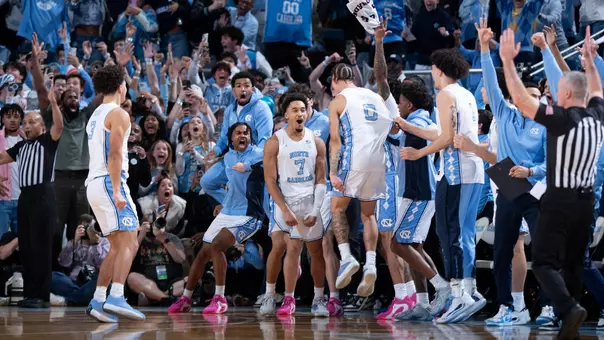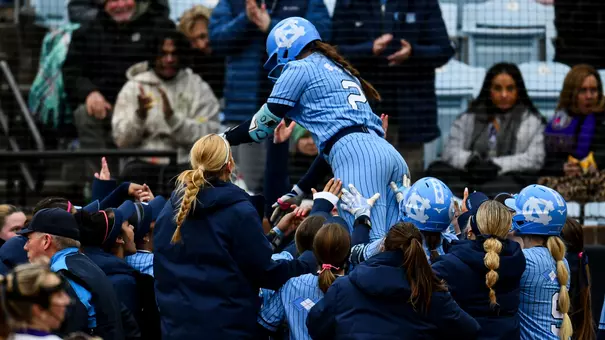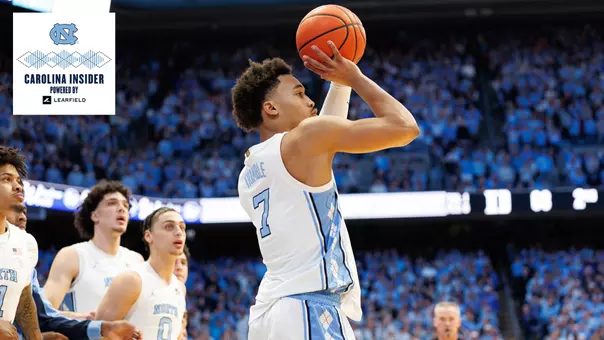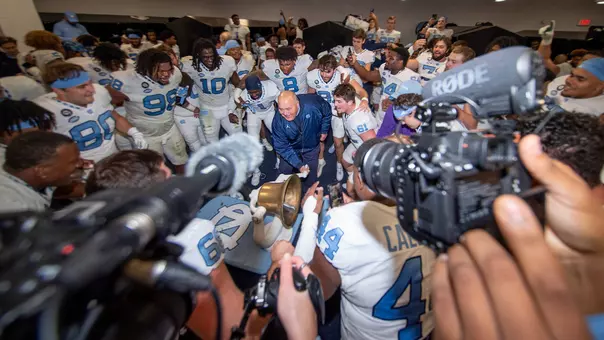University of North Carolina Athletics
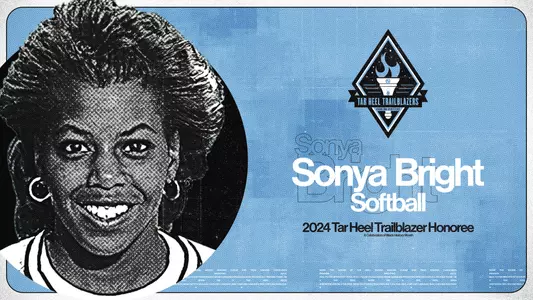
Tar Heel Trailblazer: Sonya Bright
February 13, 2024 | General, Softball
The old saying goes for every door that closes, another one opens. Then, sometimes, doors inexplicably open to unexpected opportunities. That is the story of Sonya Bright becoming the first African American softball player at the University of North Carolina.
A member of the slow-pitch softball team at Jordan High School in Durham, Bright was first noticed by former UNC strength & conditioning coach George Nevole, who was working as a substitute teacher at the school. He attended a practice and was captivated by Bright's speed, and her unanticipated journey to Chapel Hill was underway.
"I had planned to go to NC State and not play sports," she said. "I had never played fast pitch, which was another reason I didn't think Coach [Donna] Papa would go for him calling me his recruit. Little did I know she had already had a plan."
The Tar Heels needed speed at the top of the lineup, so when Bright arrived on campus in the fall of 1989, she was converted to a left-handed hitter and ultimately became one of the best leadoff hitters and base stealers in program history.
And yes, she was also a pioneer for young women of color.
"I never even thought about the fact that being 1989, I would be the first African American to play [softball at UNC]," Bright explained. "For me, it was just softball. I didn't think about my color, but I noticed that I was the only one and that other teams only had one.
"My parents brought us up in areas where we could be successful, so we went to a primarily white elementary, junior high and high school. It wasn't really a shock to me. More than anything, I wanted to show that we could do it. It didn't matter what color you are."
As a freshman, Bright led the Tar Heels in walks with 18 and posted a modest .353 on-base percentage, but the seeds of an all-conference player were planted and began to bear fruit the following season.
"It was ingenious," Bright explained. "At that point, being on that side, I had no bad habits, no mental dispositions about which way I'm supposed to see the ball coming from. I had to learn from scratch. Once she told me I was on that side and going to stay there, I had no choice but to learn, so I did."
Her job was to get on base, so Coach Papa taught her how to bunt and to place the ball against charging defenses, hitting it where they were not. She spent countless hours after practice honing her craft on the pitching machines and against live pitching to become a weapon at the top of the lineup.
Bright's on-base percentage jumped 59 points as a sophomore, and her batting average climbed to over .350 on her way to her first of three consecutive all-region team selections.
However, she grew tired of bunting constantly. She worked hard to become a complete hitter, returning to the batting cages after practice and coming in early to watch videos.
"I got tired of them knowing what I was going to do," she explained. "I would take cuts in practice, and Coach Papa told me to take a cut if I got a good pitch. From that point on, when I stepped up to that plate, it wasn't about how I would get on base, but which direction I would go."
As a senior, she capped off her career by earning First Team All-South Region and All-ACC honors, posting career-highs in every statistical category, including batting average (.393), on-base percentage (.426), triples (8) and stolen bases (32).
She concluded her career as the Tar Heels' all-time leader in at-bats (683), runs (158), and stolen bases (73), and still ranks among the program's all-time top 10 in each category 30 years later. Bright is one of only two players in school history to steal five bases in a game.
"I wasn't going to let [being Black] be the centerpiece to my opportunity," Bright said. My opportunity was given to me. I put in a lot of work and felt it was an honor to be given the privilege to play. I wasn't going to let my parents down or Coach Papa down.
"It wasn't about my color; it was more than anything about this amateur showing everybody she could learn pretty quickly, and when you see me play, you won't know any different."
She was named to the ACC's 50th Anniversary Team in 2002.
Bright, who played professionally for three years and participated in the 1996 U.S. Olympic Trials, earned her Bachelor of Science in dental hygiene and has spent the last 27 years in dentistry.
"I'm so appreciative of the honor. Carolina has done more for me than I could ever do for the school," she stated.
"Sometimes all you have to do is show up, and the opportunity will sometimes lay a path right in front of you."
A member of the slow-pitch softball team at Jordan High School in Durham, Bright was first noticed by former UNC strength & conditioning coach George Nevole, who was working as a substitute teacher at the school. He attended a practice and was captivated by Bright's speed, and her unanticipated journey to Chapel Hill was underway.
"I had planned to go to NC State and not play sports," she said. "I had never played fast pitch, which was another reason I didn't think Coach [Donna] Papa would go for him calling me his recruit. Little did I know she had already had a plan."
The Tar Heels needed speed at the top of the lineup, so when Bright arrived on campus in the fall of 1989, she was converted to a left-handed hitter and ultimately became one of the best leadoff hitters and base stealers in program history.
And yes, she was also a pioneer for young women of color.
"I never even thought about the fact that being 1989, I would be the first African American to play [softball at UNC]," Bright explained. "For me, it was just softball. I didn't think about my color, but I noticed that I was the only one and that other teams only had one.
"My parents brought us up in areas where we could be successful, so we went to a primarily white elementary, junior high and high school. It wasn't really a shock to me. More than anything, I wanted to show that we could do it. It didn't matter what color you are."
As a freshman, Bright led the Tar Heels in walks with 18 and posted a modest .353 on-base percentage, but the seeds of an all-conference player were planted and began to bear fruit the following season.
"It was ingenious," Bright explained. "At that point, being on that side, I had no bad habits, no mental dispositions about which way I'm supposed to see the ball coming from. I had to learn from scratch. Once she told me I was on that side and going to stay there, I had no choice but to learn, so I did."
Her job was to get on base, so Coach Papa taught her how to bunt and to place the ball against charging defenses, hitting it where they were not. She spent countless hours after practice honing her craft on the pitching machines and against live pitching to become a weapon at the top of the lineup.
Bright's on-base percentage jumped 59 points as a sophomore, and her batting average climbed to over .350 on her way to her first of three consecutive all-region team selections.
However, she grew tired of bunting constantly. She worked hard to become a complete hitter, returning to the batting cages after practice and coming in early to watch videos.
"I got tired of them knowing what I was going to do," she explained. "I would take cuts in practice, and Coach Papa told me to take a cut if I got a good pitch. From that point on, when I stepped up to that plate, it wasn't about how I would get on base, but which direction I would go."
As a senior, she capped off her career by earning First Team All-South Region and All-ACC honors, posting career-highs in every statistical category, including batting average (.393), on-base percentage (.426), triples (8) and stolen bases (32).
She concluded her career as the Tar Heels' all-time leader in at-bats (683), runs (158), and stolen bases (73), and still ranks among the program's all-time top 10 in each category 30 years later. Bright is one of only two players in school history to steal five bases in a game.
"I wasn't going to let [being Black] be the centerpiece to my opportunity," Bright said. My opportunity was given to me. I put in a lot of work and felt it was an honor to be given the privilege to play. I wasn't going to let my parents down or Coach Papa down.
"It wasn't about my color; it was more than anything about this amateur showing everybody she could learn pretty quickly, and when you see me play, you won't know any different."
She was named to the ACC's 50th Anniversary Team in 2002.
Bright, who played professionally for three years and participated in the 1996 U.S. Olympic Trials, earned her Bachelor of Science in dental hygiene and has spent the last 27 years in dentistry.
"I'm so appreciative of the honor. Carolina has done more for me than I could ever do for the school," she stated.
"Sometimes all you have to do is show up, and the opportunity will sometimes lay a path right in front of you."
UNC Gymnastics: Tar Heels Edged by NC State in Raleigh
Sunday, February 08
WBB: Post-Wake Forest Press Conference - Feb. 8, 2026
Sunday, February 08
UNC Women's Basketball: Brooks, Harris Push Heels Past Wake Forest, 84-56
Sunday, February 08
Carolina Insider: Rapid Reactions pres. by Modelo – Men’s Basketball vs. Duke – February 7, 2026
Sunday, February 08

